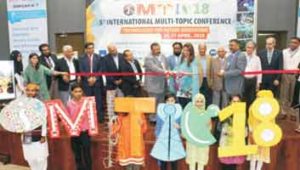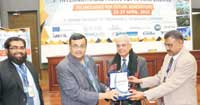Technologies for future generations have helped engineers to develop professionalism: Dr. Uqaili
Japanese Dr Hiroyuki talks about technologies altering life Scientific research not a luxury but a must for dev counties: Ghazaly
Vice Chancellor, Mehran University of Engineering (MUET) Prof Dr Aslam Uqaili has said that IMTIC’18 has raised awareness of state of the art research and provided a platform for Pakistani researchers to express their ideas and research interest and effectively developing professional relations with the experts.
Addressing an International Multi-Topic ICT Conference 2018 (IMTIC ’18) in the university he said the flagship event having a theme of `Techn ologies for future generations`, has helped engineers in developing the professionalism of ICT by considering quality standards, best practice, training & development for faculty and students.
ologies for future generations`, has helped engineers in developing the professionalism of ICT by considering quality standards, best practice, training & development for faculty and students.
Due to the technical sponsorship of IEEE, it has provided the opportunity to publish research in IEEE Xplore. He emphasized the need for an indigenous research in advanced technologies which have a significant impact on the economy and national security.
Prof Dr Hiroyuki Sato of the University of Tokyo Japan talked about advanced technologies which dramatically altered life. In his keynote “Internet Trust: Design and Deployment” he presented that as the Internet has become pervasive, the cyber-physical world has obtained its ground in human lives. A problem on the Internet is that all entities on the Internet can be hypothetical, meaning that we do not need any “real” entity in the interactions on the Internet. This kind of anonymity sometimes causes crimes including theft, fraud and spoofing in worse forms than those in our physical society.
For about thirty years, computer science has provided technologies of encryption that have enabled us to communicate in secure ways and to authenticate the counterparts on the Internet. This was the first lodgment for establishing trustworthy communications. Particularly, we can say that we owe the success of e-commerce to SSL.
In order to establish trust in the Internet, we must consider how we design assurance levels, which is a challenge of technologies including risk analysis, and how we deploy the framework of trust, which is rather a challenge of social systems. Various talents for security, audit, privacy and legislation have been and are being collected to establish a framework of trust. That is, we are witnessing the emergence of modern trust engineering for the Internet. We must review the Internet trust for various fields in view of technologies and social systems, and may discuss its future directions.
Guest of ho nour and keynote speaker Prof Samir M. El-Ghazaly, from University of Arkansas USA said advanced technologies dramatically altered life as they impacted the way people performed daily functions. He said they had a significant impact on the economy and national security. “Scientific research” is not a luxury that only developed countries could afford. It is a vital necessity for every modern society. It is even more essential in the developing countries and for societies aspiring to catch up with advancement, ` he said.
nour and keynote speaker Prof Samir M. El-Ghazaly, from University of Arkansas USA said advanced technologies dramatically altered life as they impacted the way people performed daily functions. He said they had a significant impact on the economy and national security. “Scientific research” is not a luxury that only developed countries could afford. It is a vital necessity for every modern society. It is even more essential in the developing countries and for societies aspiring to catch up with advancement, ` he said.
Technical Papers
IEEE Karachi Section Chair Prof Dr Shahid Shaikh appreciated the quality of papers submitted in the conference. He said organizing committee was only able to accept around 34 technical papers out of the total 200 to maintain high technical standards. This represents an acceptance rate of less than 20 percent. He said the conference brought researchers and industrialists together to bring out solutions to problems being faced by this modern society of social media.
Others who also spoke on various  topics regarding Design and Optimization of New Generation of Optical Sensors, smart grid, energy solutions, Big Data Management, Machine learning, Power Electronics, Robotics and UAVs social media problems and their solutions, included Prof Dr B.M.A Rahman of City University UK, Dr Tariq Masood of University of Bath United Kingdom, Prof Dr Mohammad Shafry Mohammad Rahim of University Teknologi Malaysia, Dr Fauzia Abro,City University UK, Dr Nadia Yasir Qadri, COMSATS Taxila, Dr Kashif Nisar, University Malaysia Sabah, Malaysia, Dr. Lorenzo Luini,Politecnico di Milano, Italy, and general manager (technical) Dr Mohammad Yasir Qadri.
topics regarding Design and Optimization of New Generation of Optical Sensors, smart grid, energy solutions, Big Data Management, Machine learning, Power Electronics, Robotics and UAVs social media problems and their solutions, included Prof Dr B.M.A Rahman of City University UK, Dr Tariq Masood of University of Bath United Kingdom, Prof Dr Mohammad Shafry Mohammad Rahim of University Teknologi Malaysia, Dr Fauzia Abro,City University UK, Dr Nadia Yasir Qadri, COMSATS Taxila, Dr Kashif Nisar, University Malaysia Sabah, Malaysia, Dr. Lorenzo Luini,Politecnico di Milano, Italy, and general manager (technical) Dr Mohammad Yasir Qadri.
Prof Dr Manzoor Hussain Soomro, President, ECO Science Foundation, Islamabad was the chief guest at the Concluding ceremony.
Two parallel sessions including Innovation and entrepreneurship were also organized at MUET ZAB Campus Khairpur. Highlighting the importance of the event, Prof Dr MukhtiarUnar, Pro Vice Chancellor MUET ZAB Campus said IMTIC’18 is a celebration of achieving academic and research goals. Five years back it coincided with the Golden Jubilee of MUET, Jamshoro; a remarkable journey that started fifty-five years ago for excellence in academic pursuit.
Poster competition
The poster competition was inaugurated by Javed Memon, Director HEC Regional Centre Karachi. There were more than 40 posters participated by students of several universities. Prof Dr Faisal Karim Shaikh, Conference Chair shared the data of IMTIC18. Around 200 papers were submitted by researchers through online Easy Chair system. The event participation was very huge. More than 500 participants including delegates, authors, researchers, postgraduate and undergraduate students, IEEE Executive Committee members, and industry professionals participated in the event.
